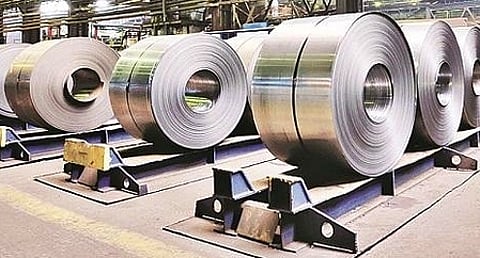

The Directorate General of Trade Remedies (DGTR) has proposed a 12 percent safeguard duty on imports of non-alloy and alloy steel flat products to curb excessive imports and protect the domestic steel industry.
In its investigation report released on Tuesday, DGTR finds a substantial rise in steel imports, adversely impacting domestic manufacturers by eroding market share, reducing profitability, and causing underutilization of production capacity.
The investigation was launched following a petition from the Indian Steel Association (ISA), representing major domestic producers, alleging a significant increase in imports causing serious injury to the Indian steel industry. The DGTR initiated the investigation on December 19, 2024, analyzing financial records and market data.
The DGTR's preliminary findings revealed a sharp and sudden increase in imports of non-alloy and alloy steel flat products into India, causing significant injury to domestic steel producers. The influx of lower-priced steel products, primarily due to trade diversion from the United States, has eroded the market share of Indian manufacturers and pushed them to the brink of financial distress.
"The domestic industry is facing serious injury, and the threat of further damage is imminent," stated the DGTR in its report adding that any delay in imposing provisional measures would result in irreparable harm to the sector.
The final decision on the duty rate and its duration is pending further analysis and stakeholder consultation. The investigation covers the period from October 1, 2023, to September 30, 2024.
The global steel trade has been in turmoil since the United States imposed protective tariffs on steel imports in recent years. This move led to a redirection of steel exports to other markets, including India. Countries like the European Union, Canada, the UK, and Morocco have already responded with their own safeguard duties, ranging from 25% to 50%, to prevent their markets from being flooded with diverted shipments.
While the provisional duty aims to protect domestic producers, the DGTR acknowledged the potential impact on consumers. Steel is a critical input for numerous industries, and higher import costs could lead to increased prices for end products. However, the Authority concluded that the immediate need to safeguard the domestic industry outweighed these concerns.
According to Ajay Srivastava, founder, Global Trade Research Initiate, the proposed safeguard duty would raise steel prices, adversely affecting downstream industries such as automotive, infrastructure, and renewable energy.
“Specialised steel requirements remain unmet domestically due to technological and quality limitations, making imports essential. An estimated 10% increase in steel demand in 2025 contradicts claims that the industry is in distress and requires protectionist measures. The duty contradicts India’s “Make in India” initiative by raising costs for local manufacturers dependent on imported raw materials,” says Srivastava.
According to Ajay Srivastava, founder, Global Trade Research Initiate, the proposed safeguard duty would raise steel prices, adversely affecting downstream industries such as automotive, infrastructure, and renewable energy.
“Specialised steel requirements remain unmet domestically due to technological and quality limitations, making imports essential. An estimated 10% increase in steel demand in 2025 contradicts claims that the industry is in distress and requires protectionist measures. The duty contradicts India’s “Make in India” initiative by raising costs for local manufacturers dependent on imported raw materials,” says Srivastava.